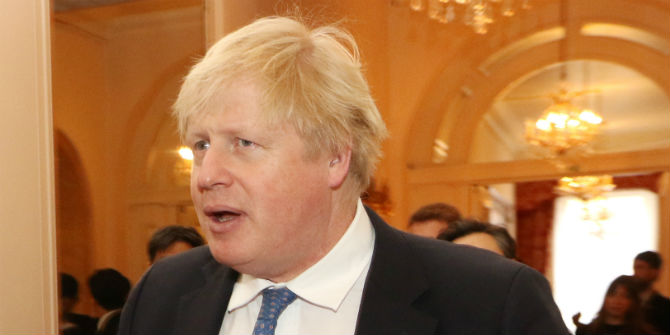
 The decision by Universities UK to campaign for Remain has had a chilling effect on academic freedom in Britain’s universities, argue Christopher Bickerton and Lee Jones. Pro-EU sentiment has stifled debate about the real impact leaving the EU would have on academic work. Scientists, in particular, have warned that leaving would doom their research. In fact, a Brexit might correct serious inequities in hiring academic talent and the EU’s contribution to UK research funding is only just over 6%. Remain campaigners are misrepresenting statistics in order to defend a cultural and political preference.
The decision by Universities UK to campaign for Remain has had a chilling effect on academic freedom in Britain’s universities, argue Christopher Bickerton and Lee Jones. Pro-EU sentiment has stifled debate about the real impact leaving the EU would have on academic work. Scientists, in particular, have warned that leaving would doom their research. In fact, a Brexit might correct serious inequities in hiring academic talent and the EU’s contribution to UK research funding is only just over 6%. Remain campaigners are misrepresenting statistics in order to defend a cultural and political preference.
So far, the debate on ‘Brexit’ has been utterly laughable, reflecting both the narrowness and short-sightedness of contemporary politics, and the fact that the debate is being ‘led’ on both sides by conservatives. The debate essentially boils down to whether your weekly groceries will be £4.32 more costly or £3.16 cheaper inside or outside of the EU, or whether Brexit will make it more or less likely that you’ll be murdered in your sleep by a criminal immigrant. ‘Project Fear’ looms large on both sides. Saddest of all, this is even true where reasoned debate should have been strongest – in Britain’s universities.
There are certainly some academics doing good work around Brexit. KCL’s UK in a Changing Europe programme is formally neutral, provides evidence to allow people to judge the issues for themselves, and hosts both pro- and anti-Brexit opinion.
But this work is the exception. The norm is vociferous pro-EU boosterism, combined with heavy doses of ‘Project Fear’, warning that British universities will be severely harmed by Brexit.
The chief offender here is Universities UK, the sector’s chief lobby group, which launched a ‘Universities for Europe’ campaign in July 2015. Their entirely utilitarian case against Brexit is as follows: over 125,000 EU students currently study at UK universities, generating £2.27bn for the UK economy and 19,000 jobs; 15,000 academic staff in the UK are from other EU states; and over 200,000 UK students have benefited from the Erasmus programme. Some vague statements are made about EU research funding, plus transparently weak efforts to link the total economic activity generated by universities to ‘EU support’.
UUK committed British universities to ‘promote powerful evidence and highlight compelling stories about the benefits of EU membership’ without any internal debate, nor any consideration of academic freedom. A managerial elite should not be able to commit a university – which is a community of scholars – to any position without the consent of that community. This position has arguably created a chilling effect where pro-Brexit academics avoid speaking out for fear of being branded traitors to the sector’s basic interests.
Moreover, UUK’s case against Brexit is fundamentally weak. The Erasmus statistics can be discounted as participation in the Erasmus Programme is not tied to EU membership. It currently has 927 partner institutions in 37 countries – including but not limited to the EU’s 28 member-states.

Certainly, many EU students and staff work in Britain, vastly enriching our campuses in every sense. But are we supposed to believe that Brexit would mean these people would be suddenly expelled? These people come to Britain because our universities are world-class institutions that are, relative to the vast majority of continental institutions, thriving. EU students keep coming despite a massive increase in fees, while the Euro-crisis has only intensified the exodus of talented scholars from countries like Greece, Spain and Italy. It is absurd to suggest that this would cease with Brexit. Student and staff migration would be perfectly possible without the EU’s free movement of people: student visas will still exist, and a prospective points-based immigration system would doubtless maintain access for highly-educated scholars. EU student fees might rise – but that is not a necessary consequence of Brexit. It’s a decision for future British governments and therefore, ultimately, for the British public.
The flexibility that Brexit would create around immigration policy could correct some serious inequities caused by EU rules. Since EU member-states cannot control EU migration, any UK government that wishes to reduce immigration must curb non-EU migrants. This leads to a de facto racialised immigration policy where predominantly white EU citizens are free to enter the UK, but many non-white non-EU citizens are effectively barred. Current and prospective students face regular harassment from the UK Border Agency, while non-EU staff like Paul Hamilton and Miwa Hirono have been deported and academics are subject to daily surveillance to meet strict visa rules. No doubt this stems ultimately from anti-immigration attitudes, but EU membership only fuels this sentiment further. It does not challenge it in any way. Meanwhile, EU strictures channel resultant policy in an even more irrational direction, often preventing British universities recruiting the best and brightest regardless of national origin. But again, there is nothing inherent in Brexit that means we would adopt an immigration policy hostile to EU and non-EU citizens. Many such scare stories tell us more about what we Britons think of one another than about the consequences of leaving the EU.
UUK also claim that the UK received £687m in EU research funding in 2013/14, rightly stating that the UK does disproportionately well in securing grants (15.5% of funding under ‘FP7’ and 20% of European Research Council awards). This, they point out quite correctly, fosters positive international mobility and collaboration.
But let’s put this in perspective. The total research income of UK universities in 2013/14 was £11.2bn. The EU supplied 6.1 percent of this. This is not incidental, but its loss would hardly mean the end of UK science, far from it. The UK does so well out of EU-funded research programmes because it has such a strong scientific base. It is not EU funding that makes this base successful but vice-versa. That the EU’s contribution is so high largely reflects successive UK government cuts to research funding, leading to reliance on EU funding.
Moreover, non-EU countries like Switzerland have negotiated agreements to give their universities access to Horizon 2020 funds. They are also members of the European Research Infrastructure Consortium, where since 2013 they have enjoyed equal rights with EU members. If Israeli institutions can win €203m in EU grants, there is good reason to believe that the UK would continue to enjoy access to international funding and participate in cross-border collaborative research. Suggesting that leaving the EU would end such collaboration is to assume that European researchers will not find new ways to work with one another and may even seek to ‘punish’ their British peers for the referendum outcome. This entirely ignores the history of scientific collaboration, where even dramatic obstacles such as war did not deter people from working with one another to learn more about the world. Where is the faith in the internationalism of scientific research in today’s scientific community?
Most importantly of all, when scientists wail that their ‘lab would fall apart’ outside the EU, they reflect the lamentable, Not-In-My-Back-Yard attitude of many academics to the forthcoming referendum. Any critical argument about the EU, and indeed any political argument whatsoever, seems to fall by the wayside, deemed irrelevant by those thinking only of their present research activities. The referendum is not about anyone’s lab; it is about democracy. The consequences of EU membership or exit are so vast and wide-ranging that this is the most significant political decision that will occur in our lifetimes. It is too important to reduce to pounds and pence. We all have our own interests, but sometimes we should aim to look a bit further than that.
If you don’t like the immigration regime as it applies to students and academic staff, then campaign to change it. If you think that UK science is under-funded, making us overly reliant on EU money, then demand that government funds universities properly. If this idea that popular demands should translate into government policy seems unrealistic, it simply signifies how degraded our democracy has become after decades of EU membership.
If you want to stay in the EU, then campaign for it – honestly. Don’t hide behind dodgy statistics and present what is really a cultural and political preference as a matter of economic and scientific necessity.
This post represents the views of the authors and not those of the BrexitVote blog, nor the LSE. It first appeared at the University of Cambridge’s Naked Scientists.







Thank you for your interesting article, which I believe has covered most of the topic. However, as British citizen, I would like to add that from my experience (as you could see from my name), I believe discrimination still exist in British Higher education. By leaving European Union, will open job opportunity for British people from ethnic minority to be recognized by British universities. Thank you again for your detailed article.
Compare and contrast the arguments taken by Scientists For EU (@Scientists4EU) with those from Scientists For Britain (@ScienceBritain). The former largely echo the points you raise here. The latter argue that political union is irrelevant to science and that there is no evidence (Particularly from recent UNESCO Science 2030 and Global Innovation Index reports) to support correlation between membership of the EU and scientific excellence.
No, the argument about Erasmus cannot be discounted. Brexiters are creating confusion between the wider group of countries that participate in some Erasmus actions and those countries that are full programme members (which the UK is at present, but would be at very real risk of losing if we leave). As this excellent post by EU law expert Professor Steve Peers makes clear, the official position of Vote Leave against free movement is clearly incompatible with the UK’s full participation in Erasmus post-Brexit: http://eulawanalysis.blogspot.co.uk/2016/06/eu-referendum-briefing-2-how-could.html
Speaking as an Erasmus tutor, this is not about research funding: it’s about students having access to opportunities in life they would not otherwise get. It is the EU’s generous funding that allows British students to participate in Erasmus. Amongst other things, for British students on Erasmus, EU funding means non-repayable monthly grants (what the British government has taken away from British students studying in Britain). Once you take into account lower fees in other countries, and other advantages unavailable to students in the UK like housing benefit in France or massively subsidised regional travel passes in Germany, it is much, much cheaper for UK students to spend a semester or year on Erasmus than to stay at home. On the course I teach on, most students come from lower income households, are the first in their families to go to university, and are often living at home for financial reasons. I’ve been working very hard these last few years to build up our students’ participation in Erasmus and give them international opportunities in Europe that I’ve been fortunate enough to have, but which they would not have had without Erasmus. Why, just for the sake of a free kick at political elites, should we take such opportunities away from our own young people?
Well, following the Brexit vote, I am seeing UK based continental European colleagues trying to leave because they feel they are not wanted: the LSE’s Mike Savage says it took only a few hours before he received a job offer from a continental European university; Scottish universities do not know what will happen since their government is trying to stay in the EU (or test the possibility); several university budgets are looking like they are going to be in terrible shape; and there is a rising level of concern about Erasmus, H2020, and other funding sources. There is also a sense among the general public of ‘what have we done?’ This all suggests you were a bit too keen to propose the Brexit option could leave UK universities not too badly off .
“Moreover, non-EU countries like Switzerland have negotiated agreements to give their universities access to Horizon 2020 funds. They are also members of the European Research Infrastructure Consortium, where since 2013 they have enjoyed equal rights with EU members. If Israeli institutions can win €203m in EU grants, there is good reason to believe that the UK would continue to enjoy access to international funding and participate in cross-border collaborative research. Suggesting that leaving the EU would end such collaboration is to assume that European researchers will not find new ways to work with one another and may even seek to ‘punish’ their British peers for the referendum outcome. This entirely ignores the history of scientific collaboration, where even dramatic obstacles such as war did not deter people from working with one another to learn more about the world. Where is the faith in the internationalism of scientific research in today’s scientific community?”
Pity that this optimism is proving to be misplaced already, before Brexit has even happened… http://www.nature.com/news/e-mails-show-how-uk-physicists-were-dumped-over-brexit-1.20380